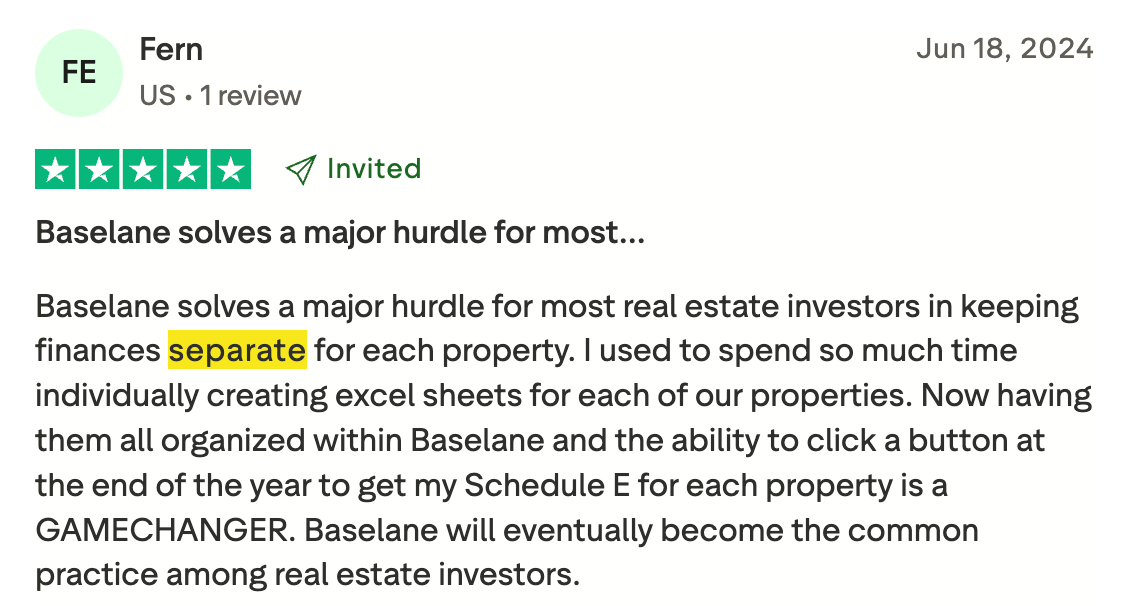The path to building real estate wealth often begins simply: you buy your first rental property, and before long, you're officially a landlord. But as a new investor, you might find yourself juggling rent payments, maintenance expenses, and personal bills—all from the same bank account. This financial mix-up is a recipe for stress, especially when tax season rolls around.
As a landlord operating as a sole proprietor, you need a straightforward system to keep your finances clear, compliant, and ready to scale. We're here to show you how you can manage your rental business effectively, giving you the time back to focus on growth, not manual reconciliation.
Key takeaways
- A sole proprietorship landlord operates their rental business as an extension of themselves, without a separate legal entity.
- Separating your personal and rental finances with a dedicated business bank account for landlords is vital for clarity and tax compliance.
- Effective bookkeeping, expense tracking, and understanding schedule E filing are cornerstones of managing finances as a sole proprietor.
- Landlord-specific banking solutions can simplify financial management, offering multiple sub-accounts and automated expense categorization.
- While an LLC offers liability protection, a sole proprietor landlord can implement strong financial practices to mitigate risks and streamline operations.
Who is a sole proprietor landlord?
A sole proprietor is the default legal classification for a real estate investor who owns and manages a rental property in their own name and hasn't registered a separate legal business entity, such as a limited liability company (LLC) or a corporation.
The sole proprietor landlord is an individual and their business are considered one and the same by the IRS, which means all rental income and expenses flow directly through your personal tax return. This structure is common for investors just starting out, who own one to four units and handle the majority of the day-to-day tasks themselves.
For example, if you own a single rental home or a duplex and manage it yourself, you are likely operating as a sole proprietorship landlord. This setup, often called sole ownership landlord or personal landlord business, keeps administrative overhead low, but requires diligent financial management. Understanding this fundamental business structure helps you navigate the specific financial requirements of being a landlord sole proprietor.
Sole proprietorship vs. LLC for landlords
The main differences between operating as a sole proprietorship versus forming an LLC come down to legal liability and tax distinction.
As a sole proprietor, keeping rental finances separate is crucial because there is no legal shield protecting your personal assets from business-related liabilities. If a tenant sues you, your personal funds could be at risk if you've been commingling funds. This makes sound financial organization a non-negotiable step.
Laying the financial foundation: the dedicated landlord bank account
The first and most critical step in professionalizing your sole proprietorship is opening a dedicated bank account for your rental property finances.
Why a separate account is non-negotiable
Using a separate bank account prevents commingling funds, which is when you mix your personal and rental business money. Separating your finances does three essential things:
- Simplifies tax filing: Your separate bank account becomes a clean, organized ledger of all rental income and expenses, making it exponentially easier to track landlord tax deductions and complete Schedule E accurately.
- Protects personal assets: Although a sole proprietorship lacks the legal protection of an LLC, maintaining separate funds establishes a clear distinction between your personal and business finances. This separation is vital if you're ever involved in a legal dispute.
- Enhances credibility: Using a business account, even as a sole proprietor, projects professionalism to tenants and lenders, which can lead to better loan terms in the future.
A separate business bank account for a sole proprietor ensures crystal clear financial records. This clarity is invaluable when tracking income, managing expenses, and preparing for tax season. With a dedicated account, you can easily distinguish between your personal spending and your rental property's operational costs.
Steps to open your landlord account
Even without an LLC, you can open a dedicated business checking account as a sole proprietor. You can either open this account with a brick-and-mortar bank or a banking platform like Baselane. The process often looks similar, but the latter is much faster.
Here’s how to open your bank account as a sole proprietor with Baselane in two simple steps
- Sign up: Create an account with Baselane by using your email address.
- Select account type: Choose to open your account as an individual (sole proprietor). You'll need your Social Security Number (SSN) instead of an Employer Identification Number (EIN) for tax purposes and an ID proof.
Once you have your account, we highly recommend creating multiple virtual accounts to separate funds for
- Operating Expenses (day-to-day bills)
- Maintenance Reserves (for future repairs)
- Security Deposits (to meet legal requirements)
Baselane allows you to open unlimited virtual accounts at no cost and without a minimum balance requirement, allowing you to organize your finances by property and purpose.
How to handle tenant security deposits legally
Most states have strict rules requiring landlords to keep security deposits separate from their operating funds, often in a dedicated, non-operational account (sometimes called an escrow account).
To handle security deposits as per the law, always check the state law. For example, if you are based in Florida, you can keep security deposits in an interest-bearing account, although the law does not require it. Compared to California, where there is no such law.
Being aware of the legal situation, you can decide the best way to collect and keep security deposits. If the state allows you to keep them in an interest-bearing account. That can become a passive source of income for you. To take advantage of that, open a high-yield savings account with Baselane within the main account to keep funds separate and earn interest month over month.
Core financial operations and tax compliance
Once you have your dedicated account, your next step is to automate and streamline your day-to-day financial tasks.
Automate bookkeeping and expense tracking
Trying to manually categorize every transaction for tax time is a huge drain on your time. As a sole proprietor, you need a system that does the heavy lifting for you:
- Automated bookkeeping: Look for a platform with integrated landlord bookkeeping that automatically tags all your transactions (income and expenses) by property and the correct Schedule E tax category.
- Virtual cards: Use virtual debit cards, which can be instantly created and assigned to specific properties or vendors. You can set rules on each card to automatically categorize spending and set spending limits for better cost control.
- Automated rent collection: Move past manual methods like Venmo or checks. Use an online rent collection service that automatically deposits payments directly into your separate landlord account and keeps a clean record of all transactions, including late fees and reminders.
Tax filing on Schedule E
Tax filing for a sole proprietorship landlord involves reporting rental income and expenses on Schedule E of Form 1040. Crucially, as a landlord sole proprietor, you do not pay self-employment tax on rental income, unlike active businesses. This distinction can result in significant tax savings.
Accurate bookkeeping directly translates to maximizing deductions and minimizing your tax liability. Platforms that auto-generate Schedule E reports and provide a customizable tax package, including income statements and transaction ledgers, can save you immense time. These tools ensure you have a clear view of your tax bill and help you prepare for tax season with confidence.
Simplify sole proprietor rental finances with Baselane
We built Baselane specifically for independent real estate investors like you, combining the essential tools you need into one platform.
- Dedicated banking platform: Open unlimited, no-fee virtual checking and high-yield savings accounts to perfectly separate your personal funds, maintenance reserves, and security deposits.
- Automated bookkeeping: All transactions are automatically tagged by property and Schedule E tax category, eliminating manual data entry and ensuring you don't miss any deductions at tax time.
- Rent collection: Automate rent payments, reminders, and late fees. Tenants can pay via free ACH transfer directly to your designated account.
- Virtual cards: Create unlimited virtual debit cards for different expense types (e.g., "maintenance card") with custom spending limits to keep your costs under control and expenses categorized automatically.
And, our customers love the flexibility to separate funds across multiple accounts.

Start managing your rental cash flow today
As a sole proprietor landlord, you face enough challenges without allowing your finances to become complicated. While you may plan to form an LLC as you scale, you need financial clarity today without creating unnecessary overhead.
Choosing the right partner can make all the difference. With a banking platform like Baselane, managing your rental income and cash flow becomes simpler and more transparent. You can easily open unlimited accounts for free to properly separate funds, avoiding the pitfalls of commingling.
Open an account with Baselane and get your finances under control today.
FAQs
What is a sole proprietorship landlord?
A sole proprietorship landlord is an individual who directly owns and manages rental properties. There is no legal distinction between the owner and the business, meaning personal and business assets are intertwined. This is a common structure for individual property owners, like a self-employed landlord.
Are landlords sole proprietor by default?
Many landlords start as sole proprietors by default because it requires no formal action to establish. If you own and rent out property in your own name without forming a separate legal entity like an LLC or corporation, then you are a sole proprietorship landlord. This structure defines an independent landlord.
How do sole proprietor landlords manage rental income and expenses?
A sole proprietorship landlord should manage rental income and expenses by opening a dedicated business banking account separate from personal funds. They must meticulously track all transactions, categorize expenses, and report income on Schedule E of Form 1040 for tax purposes. Tools like Baselane offer automated bookkeeping and expense tracking to simplify this process.
.jpg)













.jpg)


